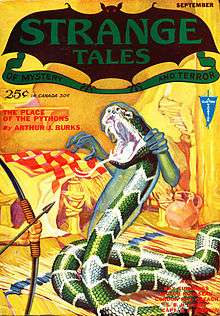Arthur J. Burks
| Arthur J. Burks | |
|---|---|
| Born |
September 13, 1898 Waterville, Washington, United States |
| Died |
May 13, 1974 (aged 75) Paradise, Pennsylvania, United States |
| Occupation | writer, military officer |
| Nationality | United States |
| Period | 1920 - 1974 |
| Genre | fantasy, horror, detective, adventure, science fiction, weird menace, aviation |



Arthur J. Burks (September 13, 1898 – May 13, 1974) was an American writer and a Marine colonel.
Biography
Burks was born to a farming family in Waterville, Washington. He married Blanche Fidelia Lane on March 23, 1918 in Sacramento, California and was the father of four children: Phillip Charles, Wasle Carmen, Arline Mary, and Gladys Lura. He served in the United States Marine Corps in World War I, and began writing in 1920. After being stationed in the Caribbean and inspired by the native voodoo rituals, Burks began to write stories of the supernatural that he sold to the magazine Weird Tales. In 1928 he resigned from the Marine Corps and began writing full-time. He became one of the "million-word-a-year" men in the pulp magazines by virtue of his tremendous output. He wrote in the neighborhood of 800 stories for the pulps.[1] He was well known for being able to take any household object that someone would suggest to him on a dare, and instantly generate a plot based around it. His byline was commonplace on pulp covers. He wrote primarily in the genres of aviation, detective, adventure, sports (primarily boxing), and weird menace. Two genres he was not to be found in were love and westerns. He wrote several series for the pulps, including the Kid Friel boxing stories in Gangster Stories, and the Dorus Noel undercover-detective stories for All Detective Magazine, set in Manhattan's Chinatown.[2] The pressure of producing so much fiction caused him to ease off in the late-1930s. He returned to active duty as the U.S. entered World War II and eventually retired with the rank of lieutenant colonel. Burks moved to Paradise in Lancaster County, Pennsylvania, in 1948, where he continued to write until his death in 1974. Throughout the '60s, he wrote many works on metaphysics and the paranormal. In his later years, he lectured on paranormal activities and gave readings.
Bibliography
Short stories
- "The Invading Horde", Weird Tales (November 1927)
- "Monsters of Moyen", Astounding Stories (April 1930)
- "The Place of the Pythons", Strange Tales (September 1931)
- "Guatemozin the Visitant", Strange Tales (November 1931)
- "The Room of Shadows", Weird Tales (May 1936)
- "The Discarded Veil" (1937)
- "The Golden Horseshoe", (1937)
- "Hell Ship", Astounding Stories (August 1938)
- "Exodus", Marvel Science Stories (August 1938)
- "Survival", Marvel Science (November 1938)
- "West Point of Tomorrow", Thrilling Wonder Stories (September 1940)
- "The Far Detour", Science Fiction Quarterly (Winter 1942)
- "Black Harvest of Moraine", Weird Tales (January 1950)
Books
- The Splendid Half Caste (1925) (first novel)
- Walter Garvin in Mexico (1927) (with Brigadier-General Smedley D. Butler)
- Rivers Into Wilderness (1932) (under penname Burke MacArthur)
- Land of Checkerboard Families (1932)
- Here Are My People (1934) (family history)
- The Great Amen (1938)
- Who Do You Think You Are? (1939) (a metaphysical treatise)
- Bells Above the Amazon, the Life of Hugo Mense Adventurer of the Spirit (1951)
- The Great Mirror (1952)
- Look Behind You (Tales of Science, Fantasy, and the Macabre) (1954) (collects 6 stories)
- Sex the Divine Flame (1961)
- Human Structural Dynamics (1964)
- Black Medicine (1966) (Arkham House)
- En-Don: The Ageless Wisdom (1973)
- Grottos of Chinatown: The Dorus Noel Stories (2009) (Off-Trail Publications)
- Man-Ape: Two Tales from the Pulps (2012)
- Cathedral of Horror and Other Stories: The Weird Tales of Arthur J. Burks: Volume #1 (2014) (Ramble House)
See also
References
- ↑ Burks gained the nickname of the "speed-king," or like designations, after publication of Robert A. McLean's profile, “Arthur J. Burks—Speed-King of Fiction.” Writers’ Markets and Methods, August 1928.
- ↑ John Locke. "Arthur J. Burks and All Detective," introduction to Grottos of Chinatown: The Dorus Noel Stories (2009).
Sources
- Jones, Robert Kenneth (1975). The Shudder Pulps. Oregon: FAX Collectors Editions.
- Locke, John (2004). Pulp Fictioneers: Adventures in the Storytelling Business. Adventure House. ISBN 978-1-886937-83-3.
- Locke, John (2007). Pulpwood Days: Volume 1: Editors You Want to Know. Off-Trail Publications. ISBN 978-0-9786836-2-7.
- Renda, Mary (2001). Taking Haiti: Military Occupation and the Culture of U.S. Imperialism. University of North Carolina Press. pp. 173–178. ISBN 0-8078-4938-3.
- Ruber, Peter (2000). Arkham's Masters of Horror. Sauk City, WI: Arkham House. pp. 249–253. ISBN 0-87054-177-3.
- Tuck, Donald H. (1974). The Encyclopedia of Science Fiction and Fantasy. Chicago: Advent. pp. 77–78. ISBN 0-911682-20-1.
External links
- Works by Arthur J. Burks at Project Gutenberg
- Works by or about Arthur J. Burks at Internet Archive
- Works by Arthur J. Burks at LibriVox (public domain audiobooks)

- Arthur J. Burks at the Internet Speculative Fiction Database